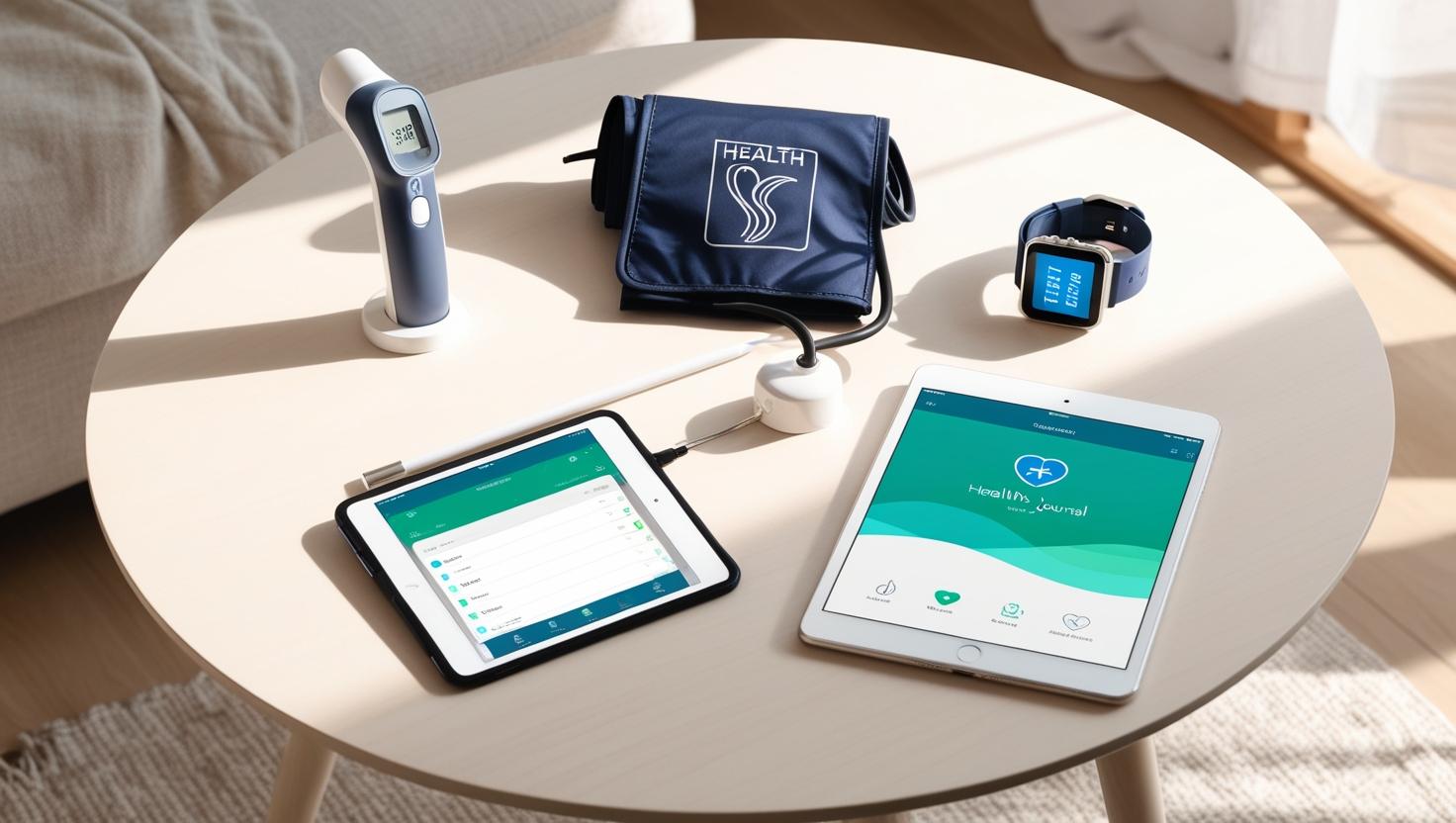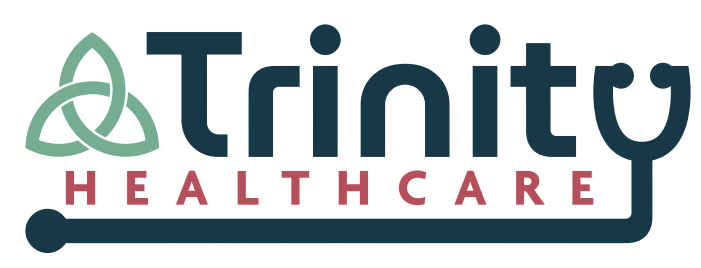- Home
- About Us
- Services
- Primary Care
- Preventative Services
- Transitional Care
- Annual Wellness Exams
- Acute Care Services
- Medical Clearance Examinations
- Chronic Disease Management
- Sports Physicals
- Geriatric Medicine
- Medication Management
- STD & UTI Testing
- Coordination of Care
- Telehealth Services
- Ordering Routine Labs and Scans
- Blog
- Patient Resources
- Contact Us

Mary Huntly APRN FNP-C
Key Takeaways
Tracking your health at home helps identify trends and detect issues early, keeping you healthier between doctor visits.
A combination of lifestyle changes, home monitoring, and collaboration with your care team leads to better chronic condition management.
Trinity Family Practice offers comprehensive, personalized care to help patients of all ages achieve their health goals.
Good health isn’t just about doctor visits—it’s also about making proactive choices to monitor and manage your health daily. By tracking your health at home, you can identify trends, prevent complications, and work seamlessly with your healthcare team to achieve better outcomes.
This guide will help you understand how to stay on top of your health between visits to Trinity Family Practice. From monitoring vital signs to managing chronic conditions and adopting healthy habits, we’ve compiled practical tips to empower you to take control of your well-being.
Whether you’re managing a chronic illness, recovering from an injury, or simply striving to stay in peak condition, these strategies will help you stay informed, engaged, and in charge of your health journey.
Understanding Your Health Care Options
Navigating your health care options can feel overwhelming at times, but having a clear understanding of the choices available to you is an important step toward staying healthy. Whether you’re managing a chronic condition, seeking preventive care, or exploring treatment plans, knowing what services and resources are out there can make all the difference.
Making informed decisions starts with knowing who to turn to and what services are best suited to your needs. By learning the roles of different healthcare providers and how they work together, you’ll be able to build a care plan that keeps you thriving between visits.
What is Primary Care?
Primary care is the foundation of good health. It’s comprehensive healthcare that addresses a wide range of needs—from preventive care to the treatment of acute illnesses and management of chronic conditions.
At Trinity Family Practice, our family physicians are trained to provide personalized, accessible, and ongoing care for individuals and families. Services like health risk assessments, immunizations, and personalized lifestyle counseling are aimed at helping you maintain your health and prevent chronic illnesses. Think of primary care as your first point of contact for all your medical needs—a trusted partner on your health journey.
Your primary care provider also acts as a central hub, coordinating any specialty care or diagnostics you may need. This continuity helps ensure nothing falls through the cracks and gives you peace of mind knowing someone is keeping an eye on the big picture of your health.
Monitoring Your Health at Home
Taking an active role in your health doesn’t end after visiting your doctor. Monitoring your health at home is a simple and effective way to stay on top of your well-being, track progress, and catch potential issues early. With the right tools and a little guidance, you can feel confident managing aspects of your health between appointments.
Building a routine of regular self-checks helps you notice changes in your body sooner, giving your doctor the information they need to offer more accurate, timely care. Plus, when you come prepared with data, it makes your office visits even more productive.
Tracking Your Vital Signs
Monitoring your vital signs—like blood pressure, heart rate, and temperature—at home is a great way to stay informed about your health between office visits.
Here’s how to get started:
Use the right tools: Invest in a reliable blood pressure monitor, thermometer, and pulse oximeter.
Keep a record: Store your readings in a health journal or mobile app to spot patterns and changes over time.
Share with your doctor: Regularly update your medical records and bring your findings to your appointments. This helps create a clearer picture of your health trends.
Keeping an eye on these numbers helps detect early warning signs before they develop into more serious problems. Many conditions, like hypertension or infections, can begin silently—making self-monitoring a key step in prevention.
Keeping a Health Journal
A health journal isn’t just for tracking numbers—it’s a powerful tool to monitor your overall well-being.
Record symptoms, medications, and lifestyle habits.
Note how you feel on different days to help correlate symptoms with potential triggers, like stress or diet changes.
Use digital apps like MyFitnessPal or paper journals—whichever suits your style.
By staying organized, you’ll be better equipped to communicate with your healthcare team and make informed decisions. Journaling can also help identify trends that might otherwise go unnoticed, giving both you and your provider deeper insights into your health.
Managing Chronic Conditions
Living with a chronic condition can feel overwhelming at times, but with the right tools and strategies, you can take control and improve your quality of life. This section will provide practical tips and insights to help you manage your condition more effectively, so you can focus on what matters most.
Even small daily efforts can make a meaningful difference in your overall health. By learning how to manage your condition at home and maintaining strong communication with your healthcare team, you can stay ahead of complications and live more comfortably.
Working with Your Health Care Team
Living with chronic conditions requires teamwork. Your healthcare team may include family physicians, internal medicine specialists, and other providers, all working together to support your needs.
Key steps include:
Open communication about your symptoms, concerns, and medications.
Collaborating on a management plan tailored to your specific condition.
Regular follow-ups to adjust treatments and ensure your progress.
Trust and transparency are the cornerstones of effective chronic care. Never hesitate to reach out between appointments if something doesn’t feel right—your team is here to help you stay in control.
Managing Chronic Conditions at Home
Managing conditions like diabetes or hypertension goes beyond medications. Here’s what you can do at home to improve your quality of life:
Follow your care plan, including taking medications as prescribed.
Maintain a healthy lifestyle with consistent exercise, balanced nutrition, and stress management.
Consider seeking additional support, like skilled care services from home health agencies for wound care or physical therapy.
The more proactive you are, the more power you have over your condition. Staying engaged with your treatment plan helps reduce hospitalizations and keeps you feeling your best day to day.
Need help managing a chronic condition? Schedule a consultation with Trinity Family Practice to get the support you need.
Staying Active and Healthy
Staying active and healthy is essential for maintaining your overall well-being, especially when managing health conditions. By incorporating regular physical activity and mindful habits into your daily routine, you can boost your energy, strengthen your body, and improve your mood, all while supporting your long-term health goals.
Small, sustainable actions can make a big difference. Whether it’s committing to a daily walk or making smarter food choices, these positive changes compound over time—leading to better outcomes and a higher quality of life.
Physical Therapy for Injury Recovery and Chronic Conditions
Recovering from injuries or managing chronic pain? Physical therapy can make a world of difference.
Work with a licensed physical therapist to create an exercise program tailored to your needs.
Improve mobility, strength, and flexibility to enhance your daily life.
Use therapy to manage conditions like arthritis, back pain, or post-surgical recovery.
A strong body leads to better health outcomes overall. Plus, therapy can prevent future injuries and keep you active well into the future.
Healthy Habits for a Healthy Life
You don’t need a health overhaul—all it takes are small changes to create lasting results.
Try these habits to build a healthier life:
Nutrition: Opt for whole, unprocessed foods and focus on balance.
Exercise: Even a 30-minute brisk walk can boost your mood and cardiovascular health.
Rest: Quality sleep is key to physical and mental performance, so aim for 7–9 hours a night.
Hydration: Drink plenty of water to keep your body functioning properly.
Avoid harmful habits: Quit smoking, limit alcohol, and take regular breaks from screens to protect your mental and physical health.
Healthy living is a long game—but with consistency, these small efforts lead to powerful results.
Additional Support Options
Taking steps to care for your overall well-being can feel overwhelming at times, but even small changes can make a big difference. Whether you’re focusing on physical health, mental clarity, or just looking for ways to feel more balanced, there are plenty of practical options to support your goals.
Incorporating outside resources can enhance your home health routine and give you the additional help you need to stay on track. If you or a loved one needs more specialized or ongoing care, consider the options below.
Home Health Agency Services
Struggling to manage your condition on your own? Home health agencies provide professional care right at your doorstep.
Skilled services like wound care, physical therapy, and occupational therapy can improve your quality of life.
Collaborate with healthcare providers to create a personalized care plan.
This is especially useful for those with limited mobility or specific medical needs.
This type of care allows patients to stay safe and independent at home while receiving the support they need.
Internal Medicine Specialists
Some conditions, like diabetes or hypertension, require specialized care. Internal medicine specialists bring advanced expertise to help you effectively manage and prevent complications.
They can conduct risk assessments, evaluate symptoms, and recommend treatments tailored to your unique needs.
Pairing their care with primary care ensures you get both specialized and holistic support.
If your condition becomes more complex or unmanageable, an internal medicine provider can help you stay ahead of the curve.
Take Charge of Your Health Today
Your health is your most valuable asset, and staying proactive can lead to a longer, healthier life. By leveraging these tips—tracking your vital signs, maintaining healthy habits, and working closely with your healthcare team—you can take control of your well-being in between office visits.
At Trinity Family Practice, we’re here to support you every step of the way. Whether you need help managing a chronic condition, improving your lifestyle habits, or just getting back on track with routine care, our experienced team is here to guide you.
Take the next step toward better health—schedule an appointment with Trinity Family Practice in Las Vegas today.
POST TAGS :
Trinity Family Practice is dedicated to offering personalized, compassionate healthcare for individuals and families in Las Vegas, with a focus on quality care you can trust at every visit.
Address
Contact
( 725) 205-2457


